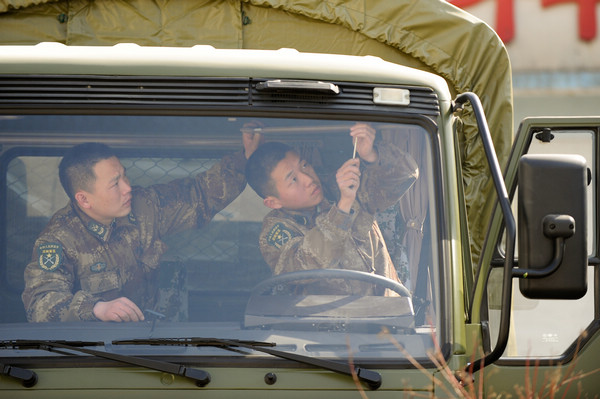Half a century after his death, Lei Feng's Regiment is still determined to carry forward his legacy, but to do so in new ways.
In numerous publications depicting those who learn from Lei Feng, the soldier famous for his devotion to the country and ultimate altruism, groups of soldiers can be seen cleaning roads or giving free haircuts.
 |
|
Li Hong (left), a squad leader in Lei Feng's Regiment, instructs a soldier in checking and repairing a truck in Fushun, Liaoning province, this month. Li Xin / Xinhua |
But such activities are not as common as they were before, said Wang Jun, deputy Party chief of the regiment in which Lei Feng was serving when he died in 1962, and which now bears his name.
"Now we put more emphasis on military training," Wang said. "We can't afford the time to dispatch our soldiers to clean streets."
Wang said the regiment regularly organizes voluntary services on weekends, when soldiers are off duty, such as repairing damaged desks and chairs for nearby schools.
"But in recent years, we have abandoned some of our long-held ways of learning from Lei Feng," said Wang.
The soldiers were once accused by a cobbler of taking away his business when they were mending shoes free for residents, said Wang.
"We realized then that such services may harm other people's interests in the new age," said Wang. "Unlike the times in which Lei Feng lived, when almost everybody worked in State-owned companies, many people now are self-employed."
So the regiment has sought new ways to help, such as cooperating with other organizations to promote Lei Feng's legacy.
"We have linked up with 384 institutes and companies to provide voluntary services during weekends," said Wang.
"For example, we are working with Shenyang Agricultural University to teach agricultural sciences to farmers to help increase their income."
The regiment has also set up a website featuring stories about Lei Feng and examples of learning from him.
An online Lei Feng Memorial Hall will also be set up soon, said Wang. Part of its purpose is to give a more detailed picture of Lei Feng and the stories about him to address some people's doubts over the authenticity of his good deeds.
"We found some young people have doubts about Lei Feng and his deeds," said Xu Lu, a guide at the regiment's Lei Feng Memorial Hall. "For example, some questioned how Lei Feng could afford to give money to people he didn't know."
"However, if you are familiar with that age and Lei Feng's background, you will have no doubt at all," Xu said.
Lei Feng was a steelworker before he joined the army, and earned much more than others in China during the late 1950s.
He was also an orphan, so he did not have parents or relatives to support, and he could well afford to give some of his savings to people in need, Xu explained.
But as a sign of how times have changed, some deeds seemingly carried out in the spirit of Lei Feng in recent years have resulted in more harm than good.
One such case involved Peng Yu, who found himself facing a court after helping an old woman who had fallen in the street at the end of 2006. The woman and her family accused Peng of knocking her down.
The issue was settled and the two parties reconciled, but it affected public attitude.
Gao Jiayuan, an instructor at Fushun city's Lei Feng Memorial Hall, said she understood the worries of some people.
"But for me I think I will offer help in such circumstances. I may be unfairly criticized later, but if the man died because I didn't help, I would feel guilty for the rest of my life," she said.
"Some people, the young in particular, express doubt and disbelief about Lei Feng, as they're not familiar with him and the times he lived in," she said.
"I don't expect every visitor to the memorial hall to become another Lei Feng," she said. "Even if a visitor performs just one good deed after he or she leaves the hall, I think my work is worthwhile."
Contact the writer at [email protected]
